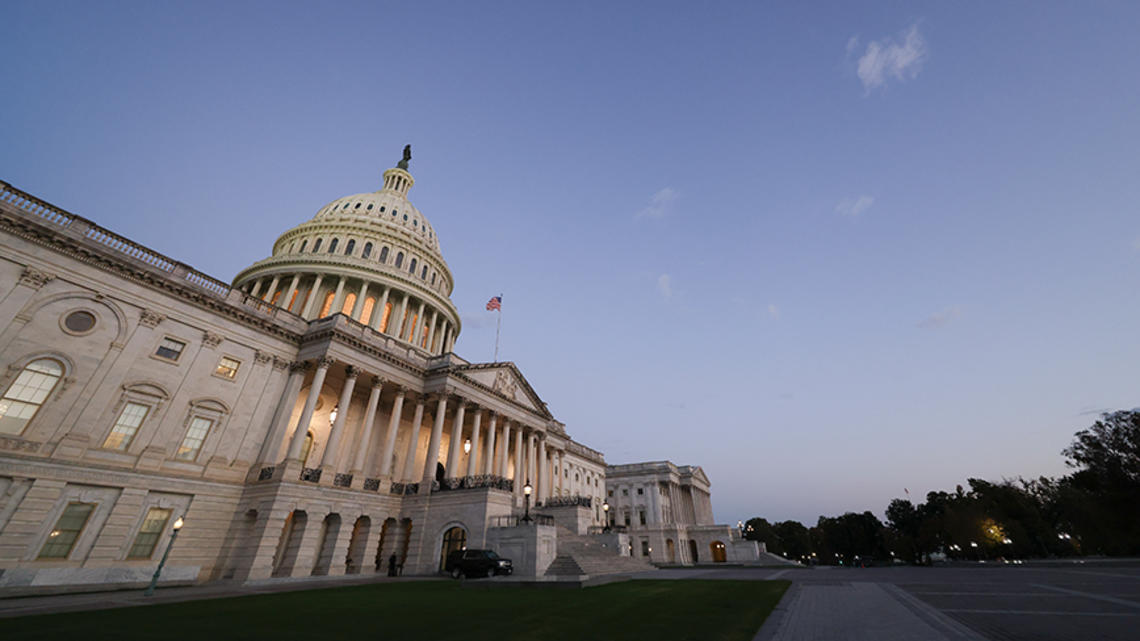

Larry Giberson ’23 has regrets about his participation in the Jan. 6, 2021, attack on the U.S. Capitol, but he told PAW he believes the pardon President Donald Trump extended to the rioters on his first day in office is “a signal of unity and a signal of forgiveness that doesn’t even necessarily apply to the individuals who receive it so much as it applies to the nation as a whole.”
Giberson was convicted of felony civil disorder and sentenced to two months in prison for his actions that day, which, according to a sentencing memorandum filed by the prosecution, included entering the Lower West Terrace Tunnel, joining others in an attempt “to create a wall of stolen police shields against the line of police officers,” and coordinating “in pushing and pulling against the police.”
Giberson spent just over seven weeks at the Federal Correctional Institute in Danbury, Connecticut, and six months on home detention at his parents’ house in Manahawkin, New Jersey, last year. Though his sentence was already complete when he was pardoned, he said it should allow him to restore his firearms purchaser identification card and serve on juries, as well as make it easier to travel internationally.
He told PAW in late January that he is still a supporter of President Trump and believes there were legal irregularities about the 2020 election, such as the expansion of mail-in balloting, that needed to be addressed. He also believes “a lot of people were treated very unfairly” by the U.S. Department of Justice for their role in the riot. More than 1,000 people pleaded guilty or were convicted of federal charges for their roles in the riot as of August, according to the Department of Justice.
Giberson attributes his actions on Jan. 6 in part to “the culture war [that] really flared up” in 2020 when there was “butting heads between both sides.”
“We all got crazy during COVID. Now, not everybody got as wet and wild as I did, but I think there’s this period in our history … [when] people were at a loss for what to do, or how to act. And so, I think part of what this pardon is, is we’re done with that era of our history, and we can look back on it and we can learn from it, but we can also look to the future and move forward,” Giberson said.
He pointed to his youth as another contributing factor, stating that ideas can be dangerous “when you don’t know how to use them, when you haven’t gotten the context for it all yet, when you are still really just a kid and you haven’t really stepped into the real world yet.”
While admitting that he’s “no innocent,” Giberson also said that “when you’re in a crowd of people where there’s a lot of emotion and turmoil and anger roiling about, that can be a dangerous place to be. And that can be a dangerous way to get sucked up in a crowd and do things that you later regret.”
Giberson majored in politics and graduated in 2023 with the rest of his class, though when a University spokesperson was previously asked to confirm that he received his degree, they declined to comment. Giberson was arrested in March 2023, while finishing up his Princeton degree, and charged with six counts, but as part of a plea deal made that July, the other five counts were dismissed.
Since his ankle monitor was removed on Veteran’s Day weekend, Giberson has been “taking some time for me — a mental health break,” which has included “basically traveling across the country, living out of my car,” and visiting 27 states. Before he was arrested in early 2023, and while he was still a Princeton student, Giberson took a three-week trip across Canada mostly because he knew the country is one of the strictest in terms of permitting entry to convicted felons.
This month, he plans to fly to South Korea and then spend more than a month in Japan.
He isn’t sure what’s he’ll do after his Asia trip, but Giberson does know what it won’t involve: “Dealing with the legal system as firsthand as you can get it really gave a sour taste in my mouth for the practice of law. … So, I probably saved myself a lot of money on law school.”










7 Responses
William S. Adelson ’78
4 Days AgoNot Worth Covering
You let this guy troll you. Even his snarky photograph was telling of who he is. What you write about is just as important as how you write. Although I am not a “Randian,” I am reminded of her quote: “That which is not worth contemplating in life, is not worth re-creating in art.” Take it as a lesson: Don’t write about dumb people doing dumb things (even if they went to Princeton). If you want to write about ridiculous Princeton grads (who are nonetheless probably very smart), try doing a long-form story on Ted Cruz and Pete Hegseth. I guess that would be worth the read.
Erna Adelson ’79
6 Days Ago‘Unity’ View Is Delusional
The article was written a few weeks ago which might as well be a lifetime. His statement about it being “a signal of unity” is a sadly delusional view of the state of the union. His blaming the culture war is similar. Taking no responsibility for his actions at all. Deplorable.
Robert Buntrock *67
2 Weeks AgoWithdraw Giberson’s Degree
I agree with the other responses. Gilberson is a spoiled brat, should have had a longer sentence, should never have been pardoned, and getting a Princeton degree is a travesty. He bought the balderdash about legal irregularities in the 2020 election? (Yeah, by Trump and his lawyers …) Against expansion of mail balloting? (Why? Valid reasons only.) Insurrectionists were treated unfairly? How and why? One felon pardoned by another felon? Ridiculous. Withdraw his degree.
Alan Zelicoff ’75
3 Weeks AgoGiberson’s Studies in ‘Values’ at Princeton
The web page of The Daily Princetonian reported Giberson's guilty plea in July 2023 in an online article along with the following:
“Giberson graduated in May with an A.B. degree in Politics and certificates in Values and Public Life and French.”
What “values” might those be? Ugh.
Steven Washington ’84
1 Month AgoDemocracy vs. ‘Unity’
Seriously? Unity? As in join a cabal of kleptocrats led by a wannabe fascist dictator? I don’t think so. Not for one blessed moment. This is the time to stand up and fight for what’s left of this democratic republic. And this person was a politics major? Did this individual bother to study political philosophy along the way? Or American history? This article is a ridiculous waste of ink ... or keystrokes. And I’m worse off for having bothered to read it.
Mary Ethridge Williamson ’81
1 Month AgoJan. 6 Sentence Was Deserved
He’s saying “sorry, not sorry” for his lawlessness … like they all have. He deserved his punishment. The sooner he accepts that, the better off he’ll be. I hope he goes on to live a productive, law-abiding life.
Cate Adams ’08
1 Month AgoWoefully Out of Touch
What an absolutely ridiculous use of PAW readership, time, and resources to give this arrogant, feckless, selfish child more air to voice the fact that he claims limited responsibility. “It was the crowd.” His attempt to justify the pardons as anything but further support for Trump’s own denial of the lawlessness with which he views the role of the government, federal police officers, and general rule of law in our country is pathetic, disgraceful, and woefully out of touch. You still possess the naivete of youth, sir. To be privileged enough to travel is a luxury, and his parents should be ashamed of themselves, as should PAW. “I’m so happy I evaded the law and can travel to Korea and Japan…” Good grief.